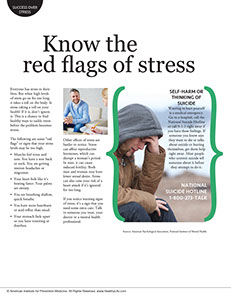SYMPTOM CHECKER
CONDITIONS
Male
Female
Child
Arm, Hand & Shoulder Concerns
Legs & Feet Concerns
Dental & Mouth Concerns
Ear & Nose
Eye Conditions
Head Conditions
Arm, Hand & Shoulder Concerns
Legs & Feet Concerns
Front
Back
Arm, Hand & Shoulder Concerns
Dental & Mouth Concerns
Ear & Nose
Eye Conditions
Head Conditions
Arm, Hand & Shoulder Concerns
Dental & Mouth Concerns
Ear & Nose
Eye Conditions
Head Conditions
Front
Back
Arm, Hand & Shoulder Concerns
Neck Links
Head & Neck Concerns
Arm, Hand & Shoulder Concerns
Neck Links
Head & Neck Concerns
Front
Back
Online Clinic
Wise Healthcare
Know the red flags of stress

Print on Demand
Everyone has stress in their lives. But when high levels of stress go on for too long, it takes a toll on the body. Is stress taking a toll on your health? If it is, don’t ignore it. This is a chance to find healthy ways to tackle stress before the problem becomes worse.
The following are some “red flags” or signs that your stress levels may be too high.
• Muscles feel tense and sore. You have a sore back or neck. You are getting tension headaches or migraines.
• Your heart feels like it’s beating faster. Your palms are sweaty.
• You are breathing shallow, quick breaths.
• You have more heartburn or acid reflux than usual.
• Your stomach feels upset or you have vomiting or diarrhea.
Other effects of stress are harder to notice. Stress can affect reproductive hormones, which can disrupt a woman’s period. In men, it can cause reduced fertility. Both men and women may have lower sexual desire. Stress can also raise your risk of a heart attack if it’s ignored for too long.
If you notice warning signs of stress, it’s a sign that you need some extra care. Talk to someone you trust, your doctor or a mental health professional.
Self-harm or thinking of suicide
Wanting to hurt yourself is a medical emergency. Go to a hospital, call the National Suicide Hotline or call 9-1-1 right away if you have these feelings. If someone you know says they want to die or talks about suicide or hurting themselves, get them help right away. Most people who commit suicide tell someone about it before they attempt to do it.
National suicide hotline: 1-800-273-TALK
Sources: American Psychological Association, National Institute of Mental Health
This website is not meant to substitute for expert medical advice or treatment. Follow your doctor’s or health care provider’s advice if it differs from what is given in this guide.
The American Institute for Preventive Medicine (AIPM) is not responsible for the availability or content of external sites, nor does AIPM endorse them. Also, it is the responsibility of the user to examine the copyright and licensing restrictions of external pages and to secure all necessary permission.
The content on this website is proprietary. You may not modify, copy, reproduce, republish, upload, post, transmit, or distribute, in any manner, the material on the website without the written permission of AIPM.
2021 © American Institute for Preventive Medicine - All Rights Reserved. Disclaimer | www.HealthyLife.com















































